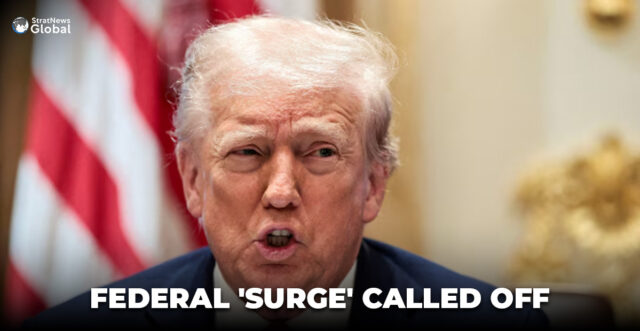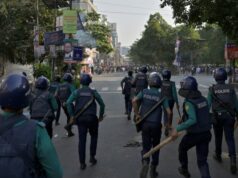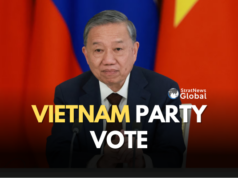U.S. President Donald Trump announced on Thursday that he would no longer move forward with plans to send federal troops to San Francisco, following conversations with the city’s mayor and mounting criticism from prominent figures in the tech industry.
The decision comes after weeks of speculation about a potential “surge” of federal forces into the city, which Trump had repeatedly suggested might be necessary to combat crime.
Tech Backlash
In a post on Truth Social, Trump explained that the federal government had been preparing to send troops to San Francisco on Saturday. However, he said, friends who live in the area—including high-profile tech leaders—advised him against proceeding.
“Friends of mine who live in the area called last night to ask me not to go forward with the surge, as the Mayor, Daniel Lurie, was making substantial progress,” Trump wrote.
Trump specifically cited Nvidia CEO Jensen Huang and Salesforce CEO Marc Benioff among those encouraging him to reconsider.
“The people of San Francisco have come together on fighting crime, especially since we began to take charge of that very nasty subject,” he said. “Great people like Jensen Huang, Marc Benioff, and others have called, saying that the future of San Francisco is bright. They want to give it a ‘shot.’ Therefore, we will not surge San Francisco on Saturday.”
Mayor ‘Spoke’ To Trump
Mayor Lurie, a Democrat elected last year with strong support from local tech executives, confirmed speaking with Trump on Wednesday night.
“I told him the same thing I told our residents: San Francisco is on the rise,” Lurie said in a statement. While welcoming continued cooperation with federal law enforcement agencies—including the FBI, DEA, ATF, and U.S. Attorney’s office—Lurie stressed that deploying the military or militarised immigration enforcement within the city would undermine its recovery efforts.
“We appreciate that the president understands that we are the global hub for technology, and when San Francisco is strong, our country is strong,” he added.
Trump has hinted at sending federal troops to San Francisco since the summer, citing concerns about rising crime.
His consideration gained momentum in recent weeks after Benioff initially expressed support for federal involvement, telling The New York Times that San Francisco lacked sufficient police presence.
“We don’t have enough cops, so if they can be cops, I’m all for it,” Benioff said.
Benioff Withdraws National Guard Support
However, Benioff reversed his stance on Friday, writing on X (formerly Twitter) that he no longer believes the National Guard is necessary to address public safety in the city.
“My earlier comment came from an abundance of caution around the event, and I sincerely apologise for the concern it caused,” he said.
Benioff, long regarded as one of San Francisco’s more progressive billionaires, has historically supported initiatives such as a 2018 business tax to fund homelessness programs.
Like many tech executives, he has shifted politically in recent years and maintains close ties with figures such as Elon Musk, whom he has praised for promoting “great vision” for Trump-era policies.
Other tech leaders also weighed in against a federal deployment. Garry Tan, CEO of the startup incubator Y Combinator, encouraged Trump to allow local leadership to continue their work.
“SF is on the way to resurgence, and there is a lot more to be done, but Mayor Lurie and DA Jenkins are doing the work,” Tan said on X. “Let them cook.”
The broader political context includes Lurie’s partnership with District Attorney Brooke Jenkins, who was appointed in 2022 after voters recalled progressive DA Chesa Boudin.
Both Lurie and Jenkins have focused on tackling crime while supporting community-led recovery efforts.
The White House emphasised that Trump’s decision reflects a willingness to work with local leaders and prioritise public safety without overstepping authority.
Trump ‘Supports’ Local Leadership
Press Secretary Karoline Leavitt told reporters that “the president is willing to work with anyone across the aisle, across the country, to do the right thing and clean up America’s cities.”
She added, “He heard from the mayor, who told him he is going to earnestly try to make his city better on his own. The president said, ‘OK, I’ll give you a chance. We’ll be watching. And if you need us, we are here.’”
Earlier this month, Trump had indicated that a future deployment was still possible. Speaking to reporters aboard Air Force One, he said, “We’re going to go into San Francisco at some point in the not-too-distant future. It can only be a great city if it doesn’t have crime. If it has crime, it can’t be a great city.”
He also suggested he might invoke the Insurrection Act to justify military action, noting, “I’m allowed… like 50% of presidents have used the Insurrection Act.”
The idea of deploying troops to San Francisco drew widespread criticism from California Democrats, including Governor Gavin Newsom and Attorney General Rob Bonta, both of whom threatened legal action.
Newsom condemned the concept as “a direct assault on the rule of law” and warned, “Sending troops to San Francisco? Do it and we’ll sue. We don’t bow to kings. We defend the Constitution.” A White House spokesperson later indicated that Trump had “listened to reason” and reconsidered the plan in light of these objections.
Legal Challenges
This episode follows a broader pattern of federal troop deployments under Trump, including earlier mobilisations in Los Angeles, Portland, Chicago, and Washington, D.C., often tied to immigration enforcement or civil unrest. Legal challenges have repeatedly limited these actions.
A federal judge in San Francisco ruled last September that the deployment of National Guard troops to Los Angeles had been unlawful, and a three-judge panel of the 9th U.S. Circuit Court of Appeals has questioned the president’s authority to deploy troops without oversight.
Despite these setbacks, Trump’s administration has continued to assert federal authority in other states.
Trump’s decision to halt the San Francisco deployment underscores the influence of both local governance and prominent business leaders in shaping federal policy.
It also highlights the ongoing tension between federal authority and state sovereignty, particularly when it comes to law enforcement and public safety in major urban centres.
By stepping back, Trump has avoided a direct confrontation with San Francisco’s elected officials while keeping open the possibility of future federal involvement.
For now, the city’s leadership, supported by local tech executives and the broader community, will continue its efforts to tackle crime and strengthen public safety without an overt military presence.
(With inputs from IBNS)





